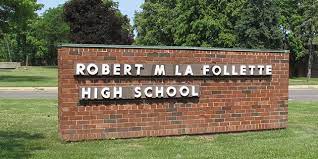
By Ryan Eykholt
Dane County TimeBank
Ryan Eykholt, staff member at Dane County TimeBank, interviewed Devon LaRosa, principal of La Follette High School.
Ryan Eykholt: What changes around restorative justice is La Follette exploring right now?
Devon LaRosa: I think the major changes we’re exploring are truly infusing student voice and creating an authentic space that’s for them. I think restorative gives us a common language and tools we can use together. It’s a vehicle, it’s an opportunity for students to join in and not be reticent and actually lead. We have to share our space with our students because everything is for them. And it’s not until we start listening regularly and intentionally that we truly transform and become a true restorative school. It’s about building a community where you don’t need to have harm repaired because you built a foundation on the grounded belief in relational trust.
RE: From your perspective, what does it mean to create an environment that is nurturing and safe for Black and Brown youth?
DL: It’s a space where youth know that people care about them. A place where they feel they can thrive. We’re building a Home Center that’s going to have a braiding studio, barber studio, food pantry, clothing closet and laundromat. We want to intentionally remove barriers. If our kids need something, it’s there for them; and there’s no shame and no blame and no judgment. Take what you need. This is for you. Removing barriers for things there is a necessity for.
The other thing is we’re building a multicultural center for all our kids — to have your meeting, to have your space, for you to drum up ideas. You want to lead something you are passionate about or create signs or speak out against something? This is the space that was designed for you to have a voice and be yours.
RE: What do you see as the biggest potential in deeply investing in restorative justice at La Follette? What does it open up?
DL: I think the paradigm shift is a flip from “Who did this?” to “How do we support our students’ unique and individual needs? What do you need in this moment and in the future?” I think the biggest benefit is how we come together now, next week, four years from now, ten years from now. It’s that intentional space, that intentional commitment that we’re building. I think that’s important work.